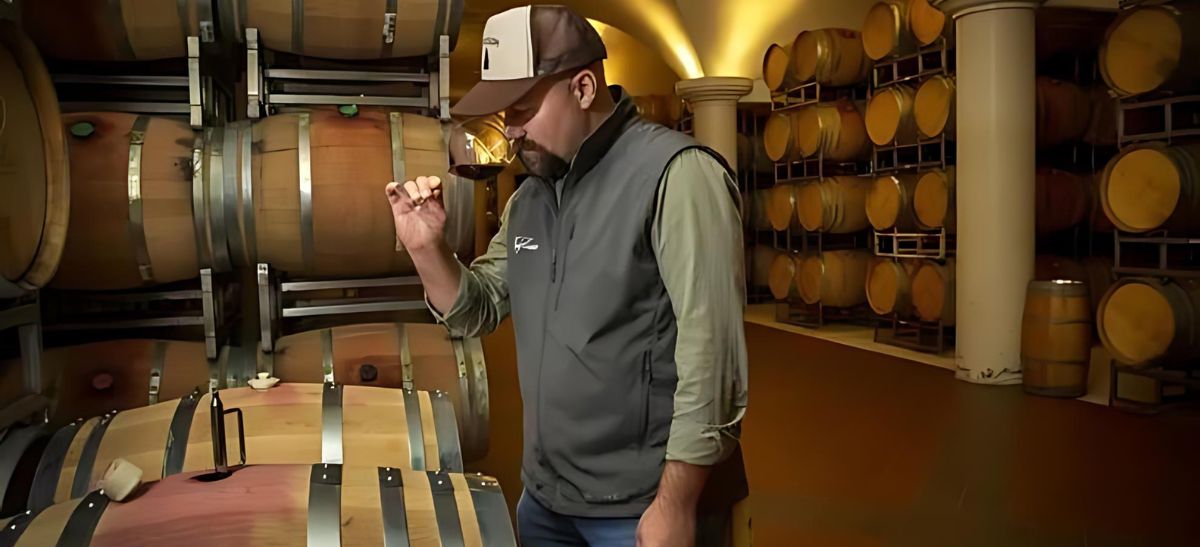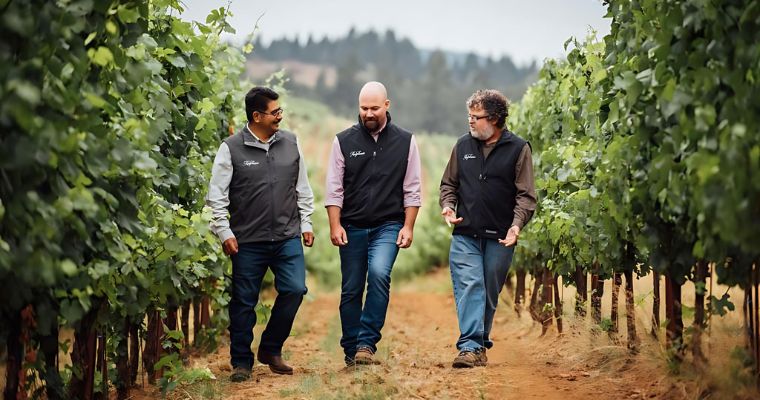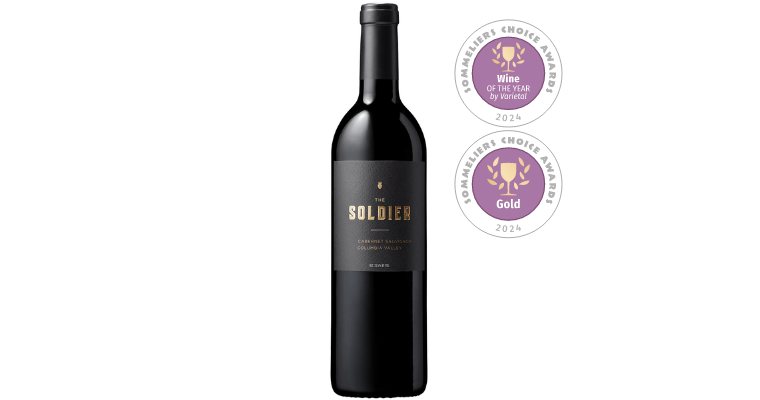Final
Deadline
April 16, 2026
Judging
Date
May 18, 2026
Winners
Announced
June 10, 2026

Although Pacific Northwest-native Brent Stone began his career in the dairy industry, he quickly found his place with wine. Stone was this year promoted to co-chief executive officer of King Estate Winery in Oregon’s Willamette Valley. He brought a wealth of experience and continuity to his new role. He served as chief operating officer since 2018 and will continue as winemaker; he now shares co-CEO responsibilities with founder Ed King.
Born in Boise, Idaho, and raised in Utah, Stone holds a bachelor’s degree in environmental science from Utah State University and a master’s degree in agricultural food and life sciences from the University of Arkansas. With a decade of quality control experience, including work in the dairy industry, Stone joined King Estate in 2011 as laboratory manager and director of quality assurance. He later completed an enology certificate program at Washington State University and became the winery's winemaker in 2016. As COO, Stone oversaw all winemaking operations and will now help guide one of Willamette Valley’s largest producers as co-CEO.
Brent was kind enough to take significant time out of his busy schedule to answer some questions from Sommelier Business editor Charlie Leary. He reflects on King Estate’s history, his small lot winemaking approach, the benefits of biodynamic viticulture, the challenges faced by the industry, and much more. King’s 2019 The Soldier Cabernet Sauvignon won varietal wine of the year at the Sommeliers Choice Awards this year.
King Estate Winery was established in 1991 by the late Ed King, Jr., founder of aviation electronics company King Radio Corp. in Kansas, and his son, Ed King III, who is the winery's current Co-CEO along with Brent Stone, Co-CEO and Winemaker. The younger King discovered the 600-acre parcel of land that comprised the original estate in 1991 when he was looking for hay for his horses. He saw the potential for a vineyard and winery on the property and the Kings purchased the land that same year. The first grapes were planted in 1992 on just 16.5 acres. By 1994, more than 100 acres were planted to create the most clonally diverse soil- and climate-matched vineyard ever grown in Oregon. The first harvest of estate-grown grapes was in 1995 and totaled 20 tons. Over time the company acquired two adjoining properties, bringing the total acreage to 1,033 acres. In 2022 King Estate acquired Pfeiffer Vineyard in Junction City, a 112-acre site with 70 acres under vine, bringing total planted acreage to about 535 acres.

Image: (L-R) Meliton Martinez, Vineyard Manager; Brent Stone, Co-CEO & Winemaker; and Raymond Nuclo, Director of Viticulture.
Our current portfolio has about 25 SKUs but it varies from year to year, depending on the vintage, supply, and quality. Pinot Gris and Pinot Noir represent about 90% of our total production in a typical year. Within those two categories, we produce a wide array of single vineyard wines, single block wines, and a few different brands (i.e., Inscription Pinot Noir, Artisan Series Pinot Noir, and Artisan Series Pinot Gris). Other brands include NEXT (Red Blend) and The Soldier (Cabernet Sauvignon). Other wines we currently produce or have recently produced – both single vineyard and blends from various sources – include Sauvignon Blanc, Chardonnay, Muscat, GSM, Syrah, Petite Sirah, Grüner Veltliner, Rosé of Pinot Noir, Cabernet Sauvignon, Cabernet Franc, Merlot, Four Nobles Cuvée Blanc, Brut Cuvée sparkling wine, Pinot Blanc, Viognier, Roussanne-Marsanne, Riesling, Gewürztraminer, Semillon and Tempranillo. We source from AVAs within Oregon and Washington, primarily the Willamette Valley. We've found that one reason our winemakers like working at King Estate is the exposure and experience they get working with so many different grapes and varietals.

The Soldier Cabernet Sauvignon, Cabernet Sauvignon Wine Of The Year At Sommeliers Choice Awards
King Estate is located in Eugene, Oregon, but since 2005 we have been making wine from the inland growing regions of Washington and Oregon. Working with select vineyard partners in the Walla Walla AVA and both sides of the Columbia River's Columbia Valley AVA, we expanded our family of wines to embrace Red Blends, Rose', Cabernet Sauvignon, Riesling, Chardonnay, and other varietals that grow exceptionally well in the high altitude, sunny climate that is unique to eastern Washington and Oregon.
The Soldier's name is meant to convey authenticity (being real, at the moment), a resolute commitment to doing one's best, and reliability (in this case in terms of quality). The wine presents tremendous value to the customer. We are using highly sought-after vineyards like Quintessence, Seven Hills, Weinbau, and Bacchus. We are also using the same small lot winemaking approach that we use in our Pinot Noir programs. Lots are cold soaked in open-top tanks with daily pump overs, then moved to twice daily punch downs during fermentation. All lots also receive délestage and seed removal early in the fermentation to help soften tannins. From there, the wine is barrel-aged for 2+ years in predominantly French oak. I think it's unique to see this approach to both grape sourcing and winemaking in a wine with a $22.99 RSP.
King Estate is one of the largest (top 5) producers in Oregon but being large isn't the goal. We want to share our wines with as many customers across the country as possible because we believe in Oregon wine and want others to experience it as well. We've been fortunate to have the capacity to do that. We are firm believers in the power and quality of Oregon wine – we're as much about Brand Oregon as we are about the King Estate brand. We strive to manage our size and production so that every bottle is of equal or greater quality as any other winery in the state no matter what size. It's hard to predict the future but I expect that we will have a dynamic portfolio of wines that are made in the classic style using time-honored methods. If new technologies are developed that can improve winemaking without sacrificing quality, we are likely to adopt those sooner rather than later.
King Estate was founded on the principles of stewardship, family, and tradition. Biodynamic farming is an example of good stewardship. Organic since 2002, Biodynamics holds agriculture to a higher standard. A form of regenerative agriculture, Biodynamics considers a farm a self-sustaining ecosystem. There are several ways in which Biodynamics exceeds organic standards. For example, while the USDA, which operates the National Organic Program, allows individual parcels within a farm to be certified organic, [certification organization] Demeter requires that the entire farm be certified. Demeter goes further than the USDA by requiring that:
- 10 percent of the total acreage be set aside for biodiversity purposes;
- Fertilizers are generated on the farm itself with only a limited amount brought in;
- To the greatest extent possible, pest, disease weed control, and livestock feed all come from the farm itself. This is accomplished through the use of nine preparations, a hallmark of the Demeter process, that is made from herbs, minerals, and animal manures that are used in sprays and compost to revitalize the soil, stimulate root growth, enhance the development of microorganisms and the formation of humus (the dark organic material in soils produced by the decomposition of vegetable or animal matter), and aid photosynthesis (the process by which green plants use sunlight, carbon dioxide and water to produce oxygen, glucose and water).
While our commitment to the environment drove our decision to convert to Biodynamic farming, we do believe that consumers are increasingly discerning and are more likely to choose a brand that shares their values, including their desire to save the planet.
With all the wine choices out there, what we call accolades are one way to distinguish ourselves from others. While we like to say that the best wine is the one that tastes best to you, we can't make a new customer if they don't at least try the wine; getting their attention with a good score or accolade is one way to stand out and encourage a potential customer to try a glass or pick up a bottle. It's hard to quantify what each element of the marketing mix contributes. We think that all our marketing efforts are most successful when they work together – earned media, accolades, our sales force, pricing, packaging, and of course (and above all), the quality of the wine itself.
Extremely important. As winemakers, we collaborate with our national sales force of nine professionals to make sure that King Estate wines don't get lost in the crowd. (Oregon alone has some 1,000 wineries and we represent less than 2% of the national market.) That means participating in festivals, wine dinners, meetings, tastings, emails, phone calls, and conferences. Relationships are key to keeping King Estate wines on the menu and the shelves.
King Estate has always been a future-focused company. Our Co-Founder and Co-CEO Ed King always has his eyes on the horizon to see what's coming up and how we might respond. Some of the biggest hurdles we see are:
- Neo-prohibitionism – that is, coping with what we perceive as government overreach when it comes to communicating the health effects of wine in particular;
- An oversupply of fruit;
- Climate change (wildfires in Oregon in particular);
- Industry consolidation, both the winery and distributor sides;
- Connecting with younger consumers; and
- Overall decline in the hospitality industry driven by staffing shortages.
That's six and are probably the same ones that other producers cite. How we're addressing them is probably too much for this interview but we approach these challenges the way we operate our business – collecting data, focusing on our core business, monitoring the environment, remaining open to change and innovation, and never forgetting who we are. These are attributes that have served us well.
Header Image: Brent Stone; Source: The Register-Guard
Enter your Wines now and get in front of top Sommeliers, Wine Directors, and On-Premise Wine Buyers of USA.
